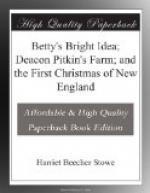In the great roomy, clean kitchen of the deacon’s house might be seen the lithe, comely form of Diana Pitkin presiding over the roaring great oven which was to engulf the armies of pies and cakes which were in due course of preparation on the ample tables.
Of course you want to know who Diana Pitkin was. It was a general fact about this young lady that anybody who gave one look at her, whether at church or at home, always inquired at once with effusion, “Who is she?”— particularly if the inquirer was one of the masculine gender.
This was to be accounted for by the fact that Miss Diana presented to the first view of the gazer a dazzling combination of pink and white, a flashing pair of black eyes, a ripple of dimples about the prettiest little rosy mouth in the world, and a frequent somewhat saucy laugh, which showed a set of teeth like pearls. Add to this a quick wit, a generous though spicy temper, and a nimble tongue, and you will not wonder that Miss Diana was a marked character at Mapleton, and that the inquiry who she was was one of the most interesting facts of statistical information.
Well, she was Deacon Pitkin’s second cousin, and of course just in that convenient relationship to the Pitkin boys which has all the advantages of cousinship and none of the disadvantages as may be plain to an ordinary observer. For if Miss Diana wished to ride or row or dance with any of the Pitkin boys, why shouldn’t she? Were they not her cousins? But if any of these aforenamed young fellows advanced on the strength of these intimacies a presumptive claim to nearer relationship, why, then Diana was astonished—of course she had regarded them as her cousins! and she was sure she couldn’t think what they could be dreaming of—“A cousin is just like a brother, you know.”
This was just what James Pitkin did not believe in, and now as he is walking over hill and dale from Cambridge College to his father’s house he is gathering up a decided resolution to tell Diana that he is not and will not be to her as a brother—that she must be to him all or nothing. James is the brightest, the tallest, and, the Mapleton girls said, the handsomest of the Pitkin boys. He is a strong-hearted, generous, resolute fellow as ever undertook to walk thirty-five miles home to eat his Thanksgiving dinner.
[Illustration: Diana.]
We are not sure that Miss Diana is not thinking of him quite as much as he of her, as she stands there with the long kitchen shovel in one hand, and one plump white arm thrust into the oven, and her little head cocked on one side, her brows bent, and her rosy mouth pursed up with a solemn sense of the importance of her judgment as she is testing the heat of her oven.
Oh, Di, Di! for all you seem to have nothing on your mind but the responsibility for all those pumpkin pies and cranberry tarts, we wouldn’t venture a very large wager that you are not thinking about cousin James under it all at this very minute, and that all this pretty bustling housewifeliness owes its spice and flavor to the thought that James is coming to the Thanksgiving dinner.




